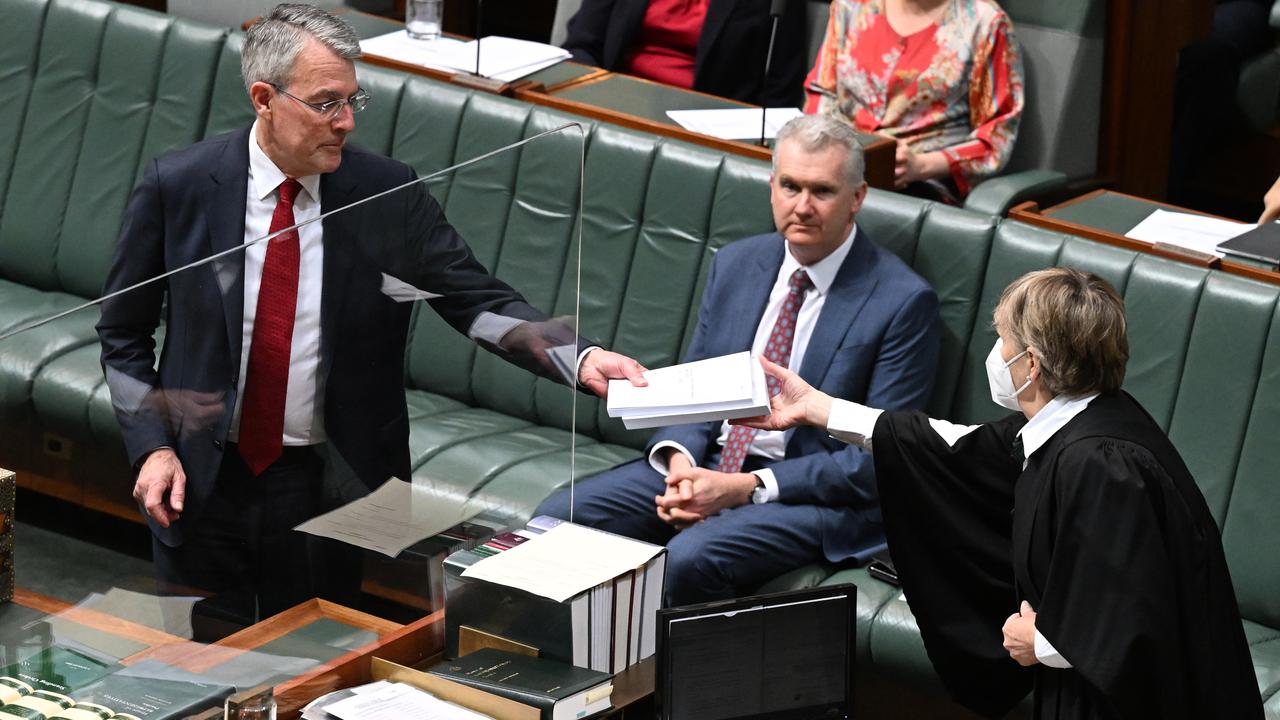A federal integrity body is finally to become a reality. While it’s a significant achievement, there are shortfalls and political hurdles. Callum Foote garners expert opinion on Australia’s National Anti-Corruption Commission (NACC) draft legislation. Whistleblower protections and secret hearings are the two big issues.
On Wednesday, Attorney-General Mark Dreyfus released the legislation which will power the promised National Anti-Corruption Commission (NACC). While a Labor government has carriage of the body, it has long been a policy plank of the expanding cross-bench of the Greens and Teal independents, particularly the MP for Indi, Helen Haines.
Not only do they advocate an anti-corruption body, they want an anti-corruption body with teeth.
So, will the NACC purge corruption from the federal sphere? Having examined the details of the legislation, experts and the cross-bench have some concerns.
Private hearings
The first and most prominent is the very high bar for public hearings contained within the legislation.
According to the legislation, the Anti-Corruption Commissioner can choose to hold all or part of a hearing in public if they are satisfied that “exceptional circumstances justify” that decision and “it is in the public interest to do so”.
This is a high, and potentially subjective, threshold for holding public hearings even by the standards of those that were expecting as much, and opens up the NACC to potential costly and lengthy High Court challenges.
Kate Griffiths, the deputy program director for budgets and government from the Grattan Institute, remarks that, “The threshold for public hearings is indeed very high – higher than I would have expected from Labor’s previous comments on their model. I expect this will be the key point of contention in parliamentary debate and public submissions”.
The NACC bill will now be referred to a joint select committee for an inquiry. Helen Haines, independent member for Indi in Victoria, has been nominated as a member of that committee. In 2018, Haines proposed her own anti-corruption body that was in principle supported by Labor at the time.

Helen Haines, MP for Indi Photo: ABC
Haines was reticent to outline her own position on the matter, though in a doorstop interview on Tuesday she referred to it as a “concern”, she said “I can tell you many of my colleagues on the cross-bench and the Greens all have concerns around that exceptional circumstances bar along with the public interest hurdle and will be making arguments to remove it from the bill.”
The NACC’s reliance on secret hearings is in line with the practices of the state anti-corruption watchdogs.
The state-based corruption watchdogs have not made a habit of wide-scale public hearings. The Independent Broad-Based Anti-Corruption Commission in Victoria has only held nine public hearings in its decade years of operation. The NSW’s Independent Commission against Corruption reveals that only five percent of all hearings have been made public.
Greens senator David Shoebridge smells a rat. “This last-minute move by Labor to restrict public hearings only to exceptional cases is exceptionally unhelpful. It has all the hallmarks of a side deal between Labor and Coalition to shield politics from scrutiny.
“People have told us how important it is to see justice done, to have accountability happen out in the open – this is a core tenet of our justice system,” he told Michael West Media.
Whistleblowers? Have they blown it?
A conspicuous absence from the legislation is the lack of any additional protections for whistleblowers.
Australia’s whistleblower protection regime has come under fire from experts for a number of high-profile failures to provide whistleblowers with adequate protections such as Australian Taxation Office whistleblower Richard Boyle and the East Timor bugging scandal’s Witness K.
According to Transparency International Australia CEO Clancy Moore “We’ve seen some high-profile cases in the media about how terribly public interest whistleblowers have been treated. That in itself is an injustice, but in addition, it sends a chilling effect to others who are seeing wrongdoing but may be too afraid to speak up.
“Whistleblowers are one of the single most effective ways to identify corruption. Without people blowing the whistle on corruption and misconduct, detecting corruption can be like searching for a needle in a haystack.”
Despite telling parliament that the government was taking the idea of a whistleblower protection agency “very seriously indeed”, the Attorney-General’s new legislation provides no new protection for those who speak out.
The problem with our current whistleblower protections, explains Professor A.J. Brown, an integrity expert and professor of public policy and law at Griffith University, is that “the protections themselves, in terms of compensation rights, are limited to things which can be proven to be deliberately in direct response to the disclosure. This significantly limits the compensation provisions for whistleblowers as the things that do them harm more often come from the negligence, mismanagement and failure in the duty of care from employers to employees.”
Same old, same old
The NACC bill, according to Professor Brown, has simply reiterated these narrow compensation provisions from the Public Interest Disclosure Act. “The way that they’ve been drafted is like a cancer that’s spreading as these provisions have already been spread into private sector whistleblowing provisions as well, and now it has spread back into this NACC legislation. This is proving to me that until they do the job properly, there will be this ongoing problem that will get worse until it gets better.”
However, even if the government can get the whistleblower protections right in law, there is still the issue regarding who will enforce these laws.
This is where the idea of a whistleblower commissioner comes in. As Professor Brown points out, a whistleblower commissioner has been recommended by the 2016 Moss Review and 2017 Senate Select Committee on a National Integrity Commission, but stretches right back to a 1994 Select Committee on Whistleblowing chaired by Tasmanian Liberal senator Jocelyn Newman.
Since 2017, there has been no federal body that is either willing or capable to investigate whistleblower reprisals. “The only agency that was in theory possibly capable of investigating reprisals against whistleblowers was the Commonwealth ombudsman,” says Professor Brown “and in 2017 they finally opened up to the fact that on their own legal advice they didn’t believe they actually had the power to do that and they weren’t doing that”.
The only option for whistleblowers was to slog it out in court, which is just not an acceptable way to protect public sector integrity.
Shoebridge told MWM that “The parliament must put in place comprehensive whistleblower protections, including a Whistleblower Commission, before the NACC opens its doors in mid 2023.”
NACC or SNACC? Labor delivers its anti-corruption body but will we get to hear about it?
The good news
Brown emphasises that what Labor “have done with this bill is a massive achievement. However, I just think that it’s indicative that a lot of people in positions of power agree in principle that whistleblower protections are vital.
“What they’re doing is impressive across the board. Why get so close to fixing the system and not doing it properly? I’m very hopeful that with the right attention we can make sure that they do”.
Now it’s down to the politics. The Labor Government has the numbers in the Lower House but requires the imprimatur of at least some of the Cross-bench in the Upper House. Just how hard will the Greens and Independents push for public hearings? We shall soon find out.
Callum Foote was a reporter for Michael West Media for four years.

